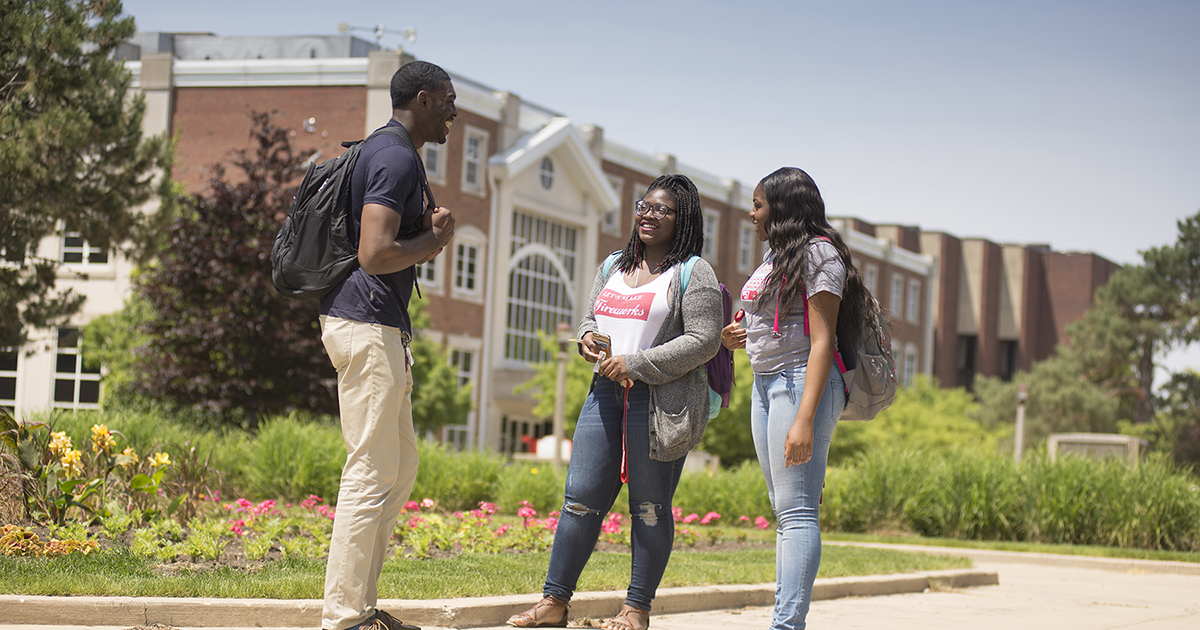Voices of Discovery is an Illinois State University program that pulls together students from diverse backgrounds to take part in frank discussions about their experiences in life and on campus.
“The program allows students to talk in a safe environment about subjects they wouldn’t normally discuss,” said Diversity Advocacy Director Hurdyln Woods, whose office runs Voices of Discovery along with Student Counseling Services. Woods called the program an eye-opening experience. “Their time in Voices of Discovery empowers students to gain new perspectives.”
The seven-week program, which is facilitated by a faculty or staff member alongside a doctoral counseling intern, prompts interested students to push past discomfort and begin difficult conversations. “People find dialogues about topics—such as race, ethnicity, sexual orientation, and gender identity—to be difficult to begin,” said Riley McGrath of Student Counseling Services.
McGrath noted people tend to veer away from difficult conversations, or pretend differences don’t exist. “Talking about what makes us ourselves is not pointing out differences,” said McGrath. “It is a way to say, ‘This is how I experience the world,’ and have those conversations that help us gain a better understanding of one another.”
The program began four years ago at Illinois State, under the impetus of staff psychologist Jason Vasquez of Student Counseling Services, who was serving as part of a multicultural and diversity outreach team in his area. Vasquez knew of the program from his days at California State at Long Beach. “We were looking for something innovative that would give students from a variety of backgrounds a chance to interact,” said Vasquez. “Voices of Discovery met our needs.”
Faculty and staff who wish to suggest students, or learn more about becoming a facilitator, can contact McGrath at rcmcgra@IllinoisState.edu
The program is known as a “diversity dialogue program,” but also includes what Vasquez calls “experimental activities,” or activities designed to make students think about issues such as privilege, power, discrimination, and identity. “There are very blunt discussions that can come out of these activities,” said Vasquez. “They are designed to make students lean in to their discomfort, and find a safe space to process that.”
Throughout the years, students have continually praised the program, and some suggested it become a required part of the first-year and transfer experience. “Students tell us they look forward to it every week,” said Vasquez, adding that students tend to take conversations from Voices of Discovery and carry them beyond the program. “They connect with other students, challenge microaggressions, and even aim for greater social justice projects.”
McGrath runs the four-hour training program for facilitators, which includes participants taking part in elements of Voices of Discovery. “Voices of Discovery can be an emotional experience, and you want to avoid a reactive environment,” said McGrath. “It’s good to let the facilitators go through the experience, and process that before they lead students.”
Not all those who go through the facilitator training end up leading groups. “We’ve had some people who just want to know more about having diversity dialogues, and they take that back to the classroom or the office and become better equipped to handle conversations on hot-button topics,” said McGrath.
The program is open to any student on campus. McGrath and Woods both said they would like to run more sessions of the program, but need more faculty and staff facilitators to do that. “It truly works when we have a diversity of participants from different backgrounds, so sharing can come from that,” said Woods, who added he hopes faculty and staff will continue to suggest students for the program. “This only works when conversations happen.”
Those students interested in taking part in Voices of Discovery can contact Diversity Advocacy at (309) 438-8968. Faculty and staff who wish to suggest students, or learn more about becoming a facilitator, can contact McGrath at rcmcgra@IllinoisState.edu, or (309) 438-3589.




